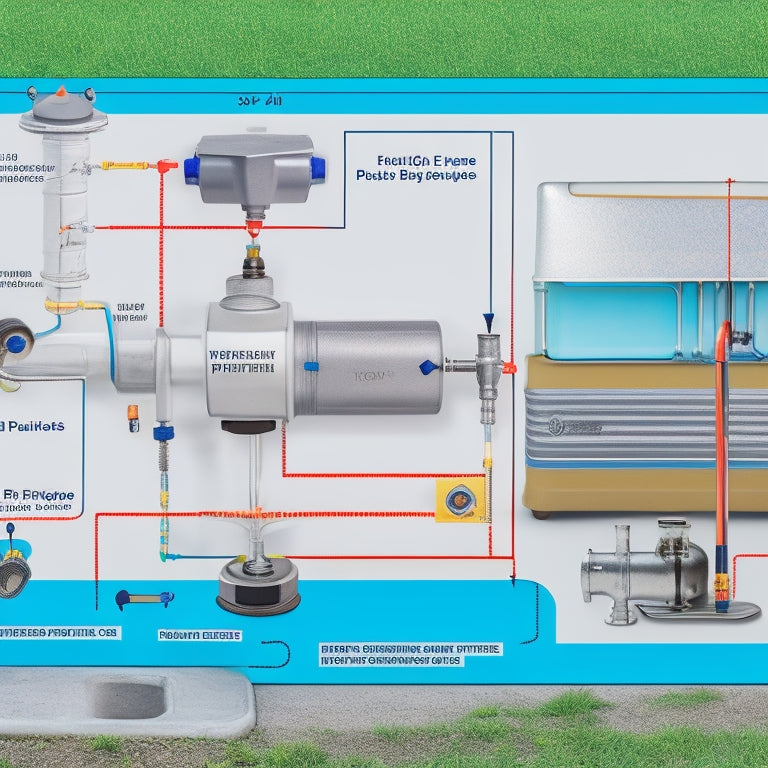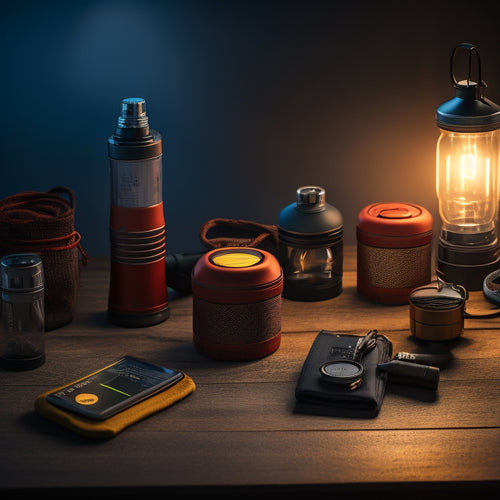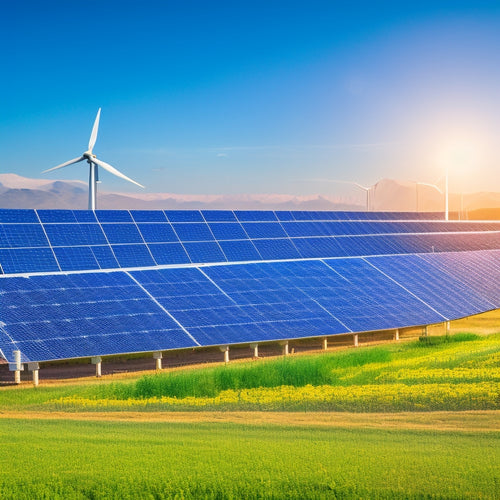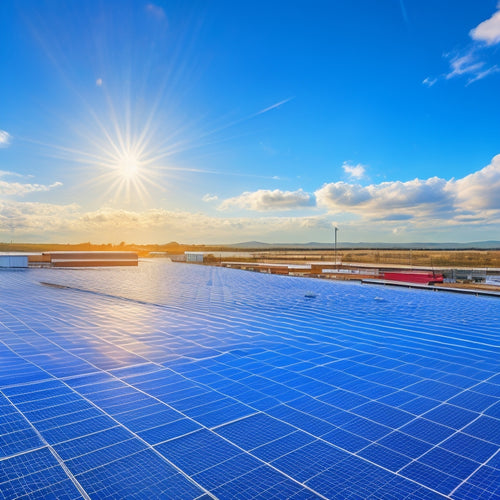
5 Tips for RV Water Pump Systems
Share
When optimizing your RV water pump system, you'll want to focus on five essential elements. First, choose the right solar panel considering wattage, panel type, local codes, warranty, and durability. Next, size your solar power system based on energy usage, solar efficiency, battery storage, power generation, and system reliability. Then, select a compatible water pump considering pump type, energy consumption, flow rates, performance alignment, and pressure management. Proper wiring and installation are also important, including wire gauge, circuit breaker, grounding, wire routing, and connection security. Finally, prioritize monitoring and maintenance to guarantee peak performance, and investigate these elements further to reveal a seamless off-grid experience.
Overview
- Ensure your RV water pump system is sized correctly by calculating daily energy usage and selecting a compatible pump and solar panel.
- Choose a high-efficiency solar panel with a comprehensive warranty to maximize energy generation and minimize maintenance.
- Select a water pump that aligns with your energy source, considering factors like flow rate, pressure, and energy consumption.
- Properly wire and install the system, following manufacturer recommendations for wire gauge, circuit breakers, and grounding.
- Regularly inspect and maintain the system, monitoring energy usage, pump performance, and filter condition to prevent issues.
Choosing the Right Solar Panel
When selecting a solar panel for your RV water pump system, frequently, the most vital aspect to take into account is the panel's wattage. This determines how much energy your system can generate, and ultimately, how efficiently it can power your water pump.
You'll want to evaluate the type of solar panel that best suits your needs. Monocrystalline and polycrystalline panels are popular options, with monocrystalline offering higher energy efficiency. Thin-film panels are another option, though they tend to be less efficient.
Additionally, it's important to assess the compatibility with local codes and confirm that your chosen panel comes with a thorough warranty.
You'll also want to assess the panel's durability and resistance to environmental factors like weather and temperature fluctuations.
Sizing Your Solar Power System
Sizing your solar power system correctly is critical to guaranteeing your RV water pump operates efficiently and reliably. You want to make sure you're generating enough power to meet your water pump's energy demands. To do this, consider your energy usage, solar power efficiency, and battery storage options.
| Energy Usage | Solar Power Efficiency | Battery Storage Options |
|---|---|---|
| 200-300 Ah/day | 20-25% efficient panels | 2x 200 Ah deep cycle batteries |
| 300-400 Ah/day | 25-30% efficient panels | 2x 300 Ah deep cycle batteries |
| 400-500 Ah/day | 30-35% efficient panels | 3x 200 Ah deep cycle batteries |
Selecting a Compatible Water Pump
Now that you've sized your solar power system to meet your energy needs, you're ready to select a water pump that will efficiently distribute water throughout your RV.
You'll need to take into account two primary factors: pump types and flow rates. Diaphragm pumps, centrifugal pumps, and submersible pumps are popular options, each with their own strengths and weaknesses.
When choosing a pump, it's important to take into account the overall energy consumption, as off-grid energy systems require careful energy management to guarantee a consistent electricity supply.
Additionally, selecting a pump that aligns with your energy sources, such as solar or generator power, is vital for peak performance.
Flow rates, measured in gallons per minute (GPM), will depend on your specific water usage needs. Calculate your peak flow rate by adding the flow rates of all fixtures and appliances that may be used simultaneously.
Make sure your pump can meet this demand to avoid pressure drops and inadequate water supply. Choose a pump that balances flow rate and pressure to assure a reliable water supply for your RV excursions.
Wiring and Installation Essentials
With your water pump selected, it's essential to guarantee a safe and efficient installation by focusing on wiring and electrical connections. Proper wiring is critical to prevent electrical shocks, fires, or pump failure. Always refer to the manufacturer's wiring diagrams and instructions to verify correct connections.
| Wiring Consideration | Importance | Tips |
|---|---|---|
| Wire gauge | Prevents overheating | Use recommended gauge for pump's amperage |
| Circuit breaker | Prevents overloads | Install breaker with correct amp rating |
| Grounding | Prevents shocks | Confirm proper grounding of pump and connections |
| Wire routing | Prevents damage | Route wires away from heat sources and moving parts |
| Connection security | Prevents loose connections | Use secure connectors and tighten properly |
Monitoring and Maintenance Tips
Your RV's water pump system is humming along, distributing water to all the necessary fixtures and appliances.
Now it's vital to keep it running smoothly with regular inspections and maintenance. Proper system design, like accurately calculating daily energy usage, is essential to guarantee your water pump system's reliability daily energy usage calculation.
Perform pump troubleshooting regularly to catch any issues before they become major problems. Check the pump's electrical connections, making sure they're secure and not corroded.
Inspect the pump's filter and clean or replace it as needed. Look for signs of wear on the pump's seals and valves, replacing them promptly if you notice any damage.
Frequently Asked Questions
How Often Should I Sanitize My Rv's Freshwater System?
You should sanitize your RV's freshwater system every 3-6 months, depending on usage, to prevent bacterial growth and contamination. Regular freshwater tank maintenance and a sanitization schedule will keep your water supply safe and clean for exploration.
Can I Use a Water Pump With a Lithium-Ion Battery?
Coincidentally, you're considering a lithium-ion battery for your water pump, and it's a great choice! You'll be pleased to know that most modern water pumps are lithium-compatible, ensuring ideal battery performance and extended lifespan for your off-grid escapades.
What Is the Recommended Water Pressure for an RV Shower?
When you're enjoying your RV shower, you'll want to maintain ideal shower water pressure between 40-60 psi, achieved through proper pressure regulation, ensuring a rejuvenating experience while conserving water and energy.
How Do I Prevent Water Pump Noise in My Rv?
To minimize annoying pump noise in your RV, you'll want to focus on reducing pump vibration and adding noise insulation. You can achieve this by mounting the pump on a vibration-dampening pad and wrapping it with acoustic insulation material.
Can I Connect My RV Water Pump Directly to a City Water Hookup?
You can connect your RV pump directly to a city water hookup, but make certain the pump's connections are compatible with city water pressure, and consider a pressure-reducing valve to prevent damage, allowing you to roam freely.
Ready to Buy
As you finalize your RV water pump system, remember that a well-designed setup can make all the difference in your off-grid escapades. Did you know that the average RVer uses around 20 gallons of water per day? With a properly sized solar panel, compatible water pump, and efficient wiring, you can guarantee a steady supply of water without draining your batteries. By following these 5 tips, you'll be well on your way to a reliable and self-sustaining RV water pump system that keeps you hydrated and happy on the road.
Related Posts
-

Best Solar Powered Flashlights for Emergency Situations
When you're choosing the best solar-powered flashlights for emergency situations, focus on their brightness, battery ...
-

The Role of Battery Monitoring Systems in Renewable Energy
Battery monitoring systems play an essential role in renewable energy by enhancing system longevity and optimizing pe...
-

Commercial Solar Energy
As you consider powering your business with commercial solar energy, you'll uncover it offers a triple benefit: signi...


